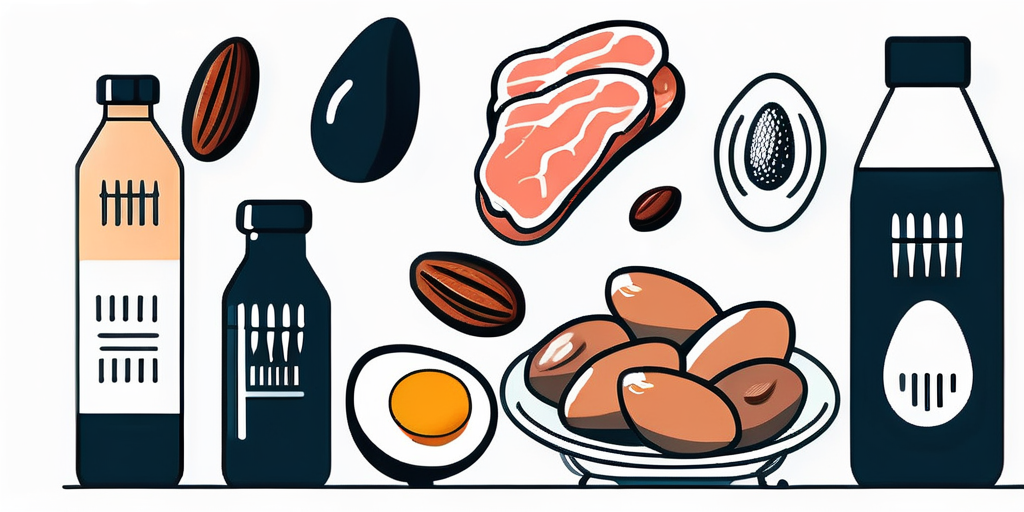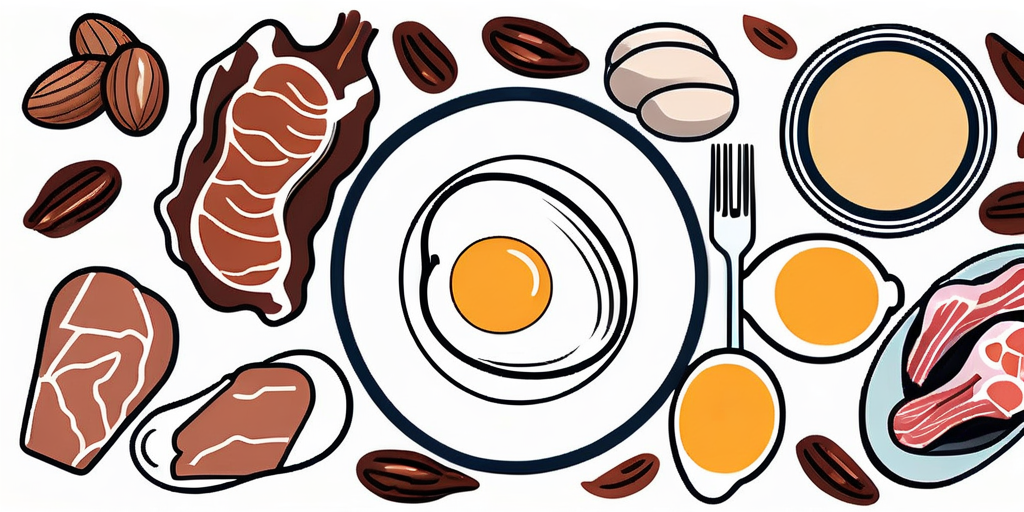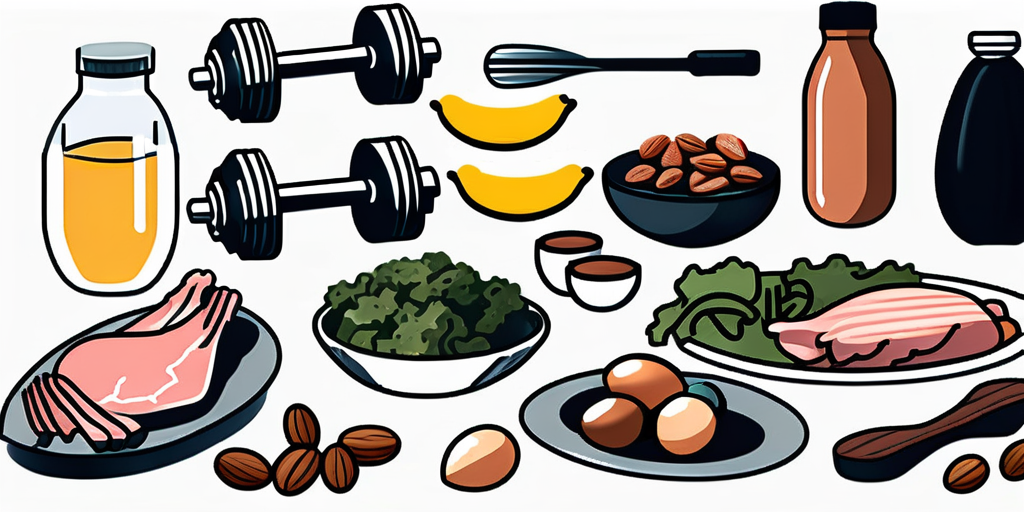A high protein diet is a popular choice for individuals looking to boost their overall health and improve their fitness levels. By understanding the basics of a high protein diet and incorporating it into your lifestyle, you can reap numerous benefits. From building muscle and increasing energy production to managing weight and improving heart health, protein plays a crucial role in achieving optimal health and fitness. This article will delve into the key components of a high protein diet, discuss how protein contributes to muscle building and energy production, explore the positive effects on weight management, bone health, and heart health, and highlight the fitness advantages of this dietary approach. Additionally, we will provide tips on incorporating a high protein diet into your lifestyle, including meal planning and a list of high protein foods to include in your diet.
Understanding the Basics of a High Protein Diet
A high protein diet focuses on consuming foods rich in protein while moderating carbohydrate and fat intake. Unlike other diet plans that restrict food groups, a high protein diet emphasizes the importance of including lean sources of protein in every meal. By doing so, you can feel satiated for longer periods, curb cravings, and maintain stable blood sugar levels.

Protein is an essential macronutrient that plays a crucial role in various bodily functions. It is responsible for building and repairing tissues, producing enzymes and hormones, and supporting a healthy immune system. Incorporating a high protein diet into your lifestyle can have numerous benefits, including improved muscle mass, increased metabolism, and enhanced weight management.
What is a High Protein Diet?
A high protein diet is characterized by consuming foods with a higher proportion of protein compared to carbohydrates and fats. It involves incorporating a variety of protein-rich foods such as lean meats, poultry, fish, eggs, dairy products, legumes, and nuts into your daily meals. This dietary approach aims to optimize protein intake to support various bodily functions and help achieve specific health and fitness goals.
When following a high protein diet, it is important to understand the different types of protein and their effects on the body. Animal-based proteins, such as those found in meat, poultry, and dairy products, provide all the essential amino acids that the body needs. On the other hand, plant-based proteins, like those found in legumes, nuts, and seeds, may lack one or more essential amino acids. However, by combining different plant-based protein sources, you can still obtain all the necessary amino acids.
Key Components of a High Protein Diet
When following a high protein diet, it is essential to consider the quality and quantity of protein consumed. Opt for lean sources of protein, such as skinless chicken, turkey, fish, tofu, and low-fat dairy products. These choices provide the necessary protein without adding excessive amounts of saturated fats. Additionally, it is crucial to distribute protein intake evenly throughout the day and include protein-rich foods in every meal. This approach ensures a consistent supply of amino acids and promotes muscle protein synthesis.
In addition to protein, a high protein diet should also include a variety of vegetables, fruits, whole grains, and healthy fats. These foods provide essential vitamins, minerals, and fiber that support overall health and well-being. It is important to strike a balance between protein and other nutrients to ensure a well-rounded and sustainable diet.
Furthermore, hydration is key when following a high protein diet. Drinking an adequate amount of water helps with digestion, nutrient absorption, and overall body function. Aim to drink at least 8 glasses of water per day to stay properly hydrated.
Lastly, it is important to consult with a healthcare professional or registered dietitian before starting any new diet plan, especially if you have any underlying health conditions or dietary restrictions. They can provide personalized guidance and ensure that your high protein diet aligns with your specific needs and goals.
The Role of Protein in the Body
Protein is a vital macronutrient that plays a fundamental role in various physiological processes within the body. Understanding how protein supports muscle building and energy production is key to comprehending the benefits of a high protein diet.
Protein is not just important for muscle building and repair, but it also has a significant impact on many other aspects of our health. Let's dive deeper into the multifaceted role of protein in the body.
Protein and Muscle Building
Protein is essential for muscle growth and repair. When you consume protein, it is broken down into amino acids, the building blocks of proteins. These amino acids provide the necessary nutrients for muscle tissue to recover and grow stronger after physical activity.
But did you know that protein also plays a crucial role in maintaining the overall health of our muscles? It helps in the synthesis of new muscle fibers, improves muscle strength, and enhances muscle endurance. This means that not only does protein help you build bigger and stronger muscles, but it also aids in preventing muscle wasting and age-related muscle loss.
Furthermore, protein is involved in the regulation of muscle protein synthesis, a process that determines the balance between muscle breakdown and muscle growth. By following a high protein diet, individuals can optimize muscle protein synthesis and enhance their athletic performance.
Protein and Energy Production
In addition to its role in muscle building, protein also contributes to energy production. When carbohydrates are limited, such as in a low-carb diet, the body relies on protein as an energy source through a process called gluconeogenesis.
Gluconeogenesis is a fascinating metabolic pathway where the body converts non-carbohydrate sources, such as amino acids from protein, into glucose. This glucose can then be used as fuel by various tissues and organs, including the brain and muscles.
By increasing protein intake, you can provide the body with an alternative fuel source, which may lead to sustained energy levels throughout the day. This is particularly beneficial for individuals following low-carb or ketogenic diets, as they heavily rely on fat and protein for energy.
Moreover, protein has a higher thermic effect compared to carbohydrates and fats, meaning that the body expends more energy to digest and process protein. This increased energy expenditure can contribute to a slight boost in metabolism, potentially aiding in weight management and fat loss.
It is important to note that while protein can be used as an energy source, its primary role is still in tissue repair, growth, and maintenance. Therefore, it is crucial to strike a balance between protein intake for muscle building and ensuring an adequate supply of carbohydrates and fats for overall energy needs.
In conclusion, protein is not just a macronutrient solely responsible for muscle building. Its impact on our health extends beyond that, influencing various physiological processes in the body. By understanding the multifaceted role of protein, we can make informed dietary choices and optimize our overall well-being.
Health Benefits of a High Protein Diet
A high protein diet offers numerous health benefits, making it an attractive dietary approach for individuals seeking to improve their overall well-being.

Protein is an essential macronutrient that plays a crucial role in various bodily functions. It is involved in building and repairing tissues, producing enzymes and hormones, and supporting a healthy immune system. Including an adequate amount of protein in your diet can have a positive impact on your health in several ways.
Weight Management and Protein
Protein-rich foods help promote satiety and reduce appetite, making it easier to manage weight. When you consume protein, it triggers the release of hormones that signal fullness to your brain, helping you feel satisfied and less likely to overeat. Including protein in your meals can help curb cravings and prevent overeating, contributing to weight loss or weight maintenance efforts.
Furthermore, protein has a higher thermic effect compared to carbohydrates or fats, meaning that the body burns more calories during the digestion and absorption process. This increased calorie expenditure can further support weight management goals.
Bone Health and Protein
Protein plays a vital role in maintaining optimal bone health. Collagen, a protein found in bones, provides them with strength and structure. Consuming sufficient amounts of protein helps prevent age-related bone loss and reduce the risk of osteoporosis, a condition characterized by weak and brittle bones.
Incorporating a high protein diet into your lifestyle can contribute to maintaining healthy bones and reducing the risk of fractures. Additionally, protein intake is often accompanied by other bone-supporting nutrients, such as calcium and vitamin D, further enhancing bone health.
Heart Health and Protein
A high protein diet, when coupled with a balanced intake of fruits, vegetables, whole grains, and healthy fats, can positively impact heart health. Several studies have shown that higher protein intake can lead to improved levels of cholesterol and blood pressure, reducing the risk of heart disease.
However, it is important to choose lean sources of protein to avoid excessive saturated fat and cholesterol intake. Opt for lean meats, poultry, fish, legumes, and plant-based protein sources to reap the cardiovascular benefits of a high protein diet.
In conclusion, a high protein diet offers a range of health benefits, including weight management, bone health, and heart health. By incorporating protein-rich foods into your meals and choosing lean sources of protein, you can enhance your overall well-being and support a healthy lifestyle.
Fitness Advantages of a High Protein Diet
Engaging in regular physical activity and following a high protein diet go hand in hand, offering multiple fitness advantages.

When it comes to achieving optimal fitness levels, it's important to consider not only the type of exercise you engage in but also the fuel you provide your body. This is where a high protein diet comes into play. By incorporating protein-rich foods into your daily meals, you can reap a multitude of benefits that will enhance your fitness journey.
Improved Muscle Recovery with Protein
Protein plays a crucial role in muscle recovery after exercise. When you engage in physical activity, your muscles undergo stress and micro-tears. Consuming protein-rich foods post-workout provides your muscles with the necessary nutrients to repair and rebuild. This process allows for faster recovery, reduced muscle soreness, and improved muscle strength and endurance.
Imagine a scenario where you push your body to its limits during a strenuous workout session. Without proper muscle recovery, your body may struggle to repair the damage done to your muscles. By incorporating a high protein diet into your routine, you can ensure that your muscles have the fuel they need to bounce back stronger than ever.
Enhanced Performance and Protein
Protein is not only vital for muscle recovery but also for optimizing athletic performance. When you engage in physical activity, your body requires energy to fuel your movements. Protein provides the body with the amino acids required for muscle contraction, improved oxygen transport, and efficient energy production.
By following a high protein diet, athletes and fitness enthusiasts can enhance their overall performance and achieve their fitness goals more effectively. Whether you're a professional athlete striving for peak performance or an individual looking to improve your endurance during workouts, incorporating protein into your diet can make a significant difference.
Additionally, protein can help with weight management. It has been found to increase feelings of fullness, reduce cravings, and boost metabolism. This can be especially beneficial for those looking to lose weight or maintain a healthy body composition.
Furthermore, protein-rich foods are often nutrient-dense, meaning they provide a wide range of essential vitamins and minerals necessary for overall health. By incorporating these foods into your diet, you can ensure that your body is receiving the necessary nutrients to support your fitness journey.
In conclusion, a high protein diet offers numerous fitness advantages. From improved muscle recovery and enhanced performance to weight management and overall health, protein plays a crucial role in achieving optimal fitness levels. So, next time you lace up your sneakers and hit the gym, don't forget to fuel your body with protein-rich foods to maximize your workout potential.
Incorporating a High Protein Diet into Your Lifestyle
Integrating a high protein diet into your daily routine can be done with careful planning and food choices.
Meal Planning for a High Protein Diet
Effective meal planning is essential for successful adherence to a high protein diet. Start by identifying your protein requirements based on your age, weight, and activity level. Then, create a balanced meal plan by incorporating lean sources of protein, along with whole grains, fruits, vegetables, and healthy fats. This approach ensures that you are meeting your nutritional needs while enjoying a variety of flavors and textures.
High Protein Foods to Include in Your Diet
There is a wide range of delicious high protein foods that can be included in your daily meals. Some examples include chicken breast, turkey, salmon, Greek yogurt, cottage cheese, eggs, lentils, quinoa, almonds, and chia seeds. By incorporating these protein-rich foods into your diet, you can ensure you meet your daily protein requirements and enjoy a diverse range of flavors.
In conclusion, adopting a high protein diet can provide numerous benefits that contribute to enhanced health and fitness. From supporting muscle building and energy production to managing weight, improving bone health, and enhancing athletic performance, protein plays a crucial role in achieving optimal well-being. By understanding the basics of a high protein diet and incorporating it into your lifestyle through effective meal planning and incorporating a variety of protein-rich foods, you can boost your health and fitness levels. So, next time you plan your meals, remember the importance of protein and its positive impact on your overall well-being.



